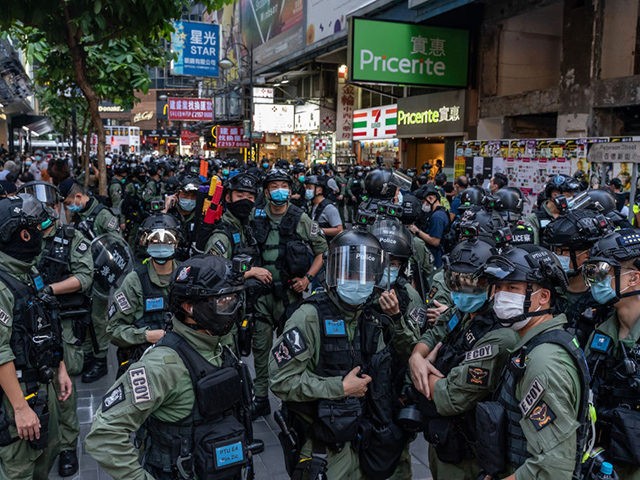Ronny Tong Ka-wah, a senior member of Hong Kong’s China-controlled leadership, insisted that the region is “no independent kingdom” in an interview Monday.
Tong warned that members of the democratically elected Legislative Council (LegCo) are not immune from prosecution by the Chinese communist regime.
In an interview with Radio Television Hong Kong (RTHK) on Monday, Tong responded to criticism over the recent Chinese-ordered arrests of several pro-democracy lawmakers.
“The legislative intent of the law is to protect the independence, dignity, and operation of the LegCo,” Tong said, “But the LegCo is no independent kingdom.”
On Sunday, seven current and former pro-democracy members of the LegCo — Wu Chi-wai, Steven Kwok Wing-kin, Raymond Chan Chi-chuen, and Eddie Chu — were arrested and charged with violating the LegCo Ordinance in relation to an incident earlier this year in which scuffles broke out between them and pro-Beijing lawmakers.
On Monday morning, the Hong Kong Police Force (HKPF) also confirmed that they had arrested opposition lawmaker Ted Hui. He was later released on bail, where he accused Hong Kong of becoming a “complete police state” under Chinese communist control.
According to Tong, a member of the Executive Council and the founder of the pro-China party ironically named Path of Democracy, the “violations” were passed over to law enforcement because the president of the LegCo, Andrew Leung Kwan-yuen was unable to handle the issue.
“Lawmakers still have to obey the laws of Hong Kong,” he contended. “The police could deal with matters that the Legco president couldn’t handle after the Legco Secretariat called the force for help.”
Although such remarks were likely off the cuff, Tong’s remarks are a sign of China’s increasing control of the region, which was granted almost complete autonomy under an agreement known as “One Country, Two Systems,” signed by China following the handover from the British Empire in 1997.
In June, Beijing’s National People’s Congress passed an illegal “national security law” that, under Hong Kong’s Basic Law, would not apply to the city. Using the loophole that “national security” is a federal responsibility, it banned practically all criticism and political opposition to Beijing and the Chinese Communist Party (CCP). It also allows police to take Hongkongers to China to face trial and possible execution.
Although the democratic world has largely rallied around Hong Kong in support of the mass pro-democracy demonstrations that have taken place over the past year, China continues to consolidate its power over the city through force. Beijing has also successfully managed to win over allies in the west. Last month, The New York Times published an opinion piece by a pro-China official in Hong Kong declaring that the city is now “part of China” whether the West “likes it or not.”
“Like it or not, Hong Kong is part of China,” read the piece, written by pro-Beijing LegCo member Ip Lau Suk-yee. “Given the two’s vast disparity in size and Hong Kong’s growing economic dependence on the mainland [China], the city’s progressive integration with China is unavoidable.”
Follow Ben Kew on Parler, Facebook, or Twitter. You can email him at bkew@breitbart.com.

COMMENTS
Please let us know if you're having issues with commenting.